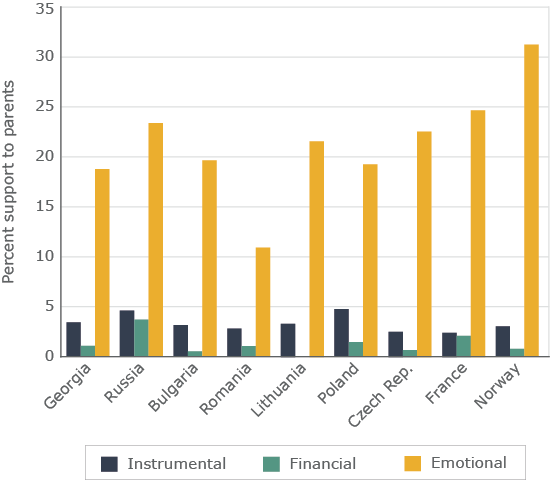Country differences in intergenerational relationships are not only due to economic, policy or housing contexts but also to a cultural tendency towards closer intergenerational ties. In a recent study, Cornelia Mureşan and Paul-Teodor Hărăguş investigated how norms of filial responsibility influence adult children to provide support to their ageing parents in several Central and Eastern European (CEE) countries as compared to Western Europe. They examined to what extent these norms are consistent with helping behaviour, whether the responsiveness to norms varies across countries, and whether CEE countries differ from societies benefiting from more generous public support to ageing people.
The study is based on data from the Generations and Gender Programme (GGP) for seven countries from Central and Eastern Europe (Bulgaria, Czech Republic, Georgia, Lithuania, Poland, Romania and Russia), and two Western European countries (France and Norway). Societal norms of filial responsibility are measured by values and attitudes of individuals towards family and intergenerational relations, in particular: “Children should take responsibility for caring for their parents when parents are in need”; “Children should adjust their working lives to the needs of their parents”; “Children ought to provide financial help for their parents when their parents are having financial difficulties”; and “Children should have their parents live with them when parents can no longer look after themselves”. In turn, support was measured in terms of instrumental care (regular practical help, personal care or help with daily activities), emotional support (listening to the problems of parents) and financial support (offering money, assets or goods of substantive value for one time, occasionally or regularly).
According to the results of this study, the belief that it is important to give support to family members is stronger in Central and Eastern Europe than in West European countries. Nonetheless, countries with relatively low levels of support from individuals for societal norms of filial responsibility (France and Norway) show higher proportions of adult children who actually support their parents when all kinds of help are considered together (emotional, instrumental and financial), in comparison to countries with high levels of support for filial responsibility (Central and Eastern European countries, with the exception of Russia).
When looking at the support for parents by type of support, more the picture is less clear. The authors showed that emotional support is the most common form of help to parents and it shows the largest variation across countries: From 10.9% in Romania to 31.2% in Norway (Figure 1). Country patterns indicate that when public support is generous, family members are more able to redistribute resources to assist emotionally those in need.
The proportion of adult children offering financial help to parents is the smallest of the three types of support, varying between 0.4% in Bulgaria and 3.6% in Russia. Instrumental help is also less common, ranging between 2.3% in France and 4.7% in Poland (Figure 1). The connection between filial responsibility and instrumental care is stronger in CEE, while the connection between financial help and norms of filial obligation is stronger in France and Norway. Interestingly, it has not been found any relationship between filial responsibility and emotional support to parents, neither in East nor in West European countries.

Figure 1: Actual support given to parents, by type of help

*This PopDigest has received funding from the European Union's Seventh Framework Programme (FP7/2007-2013) under grant agreement n° 320116 for the research project FamiliesAndSocieties. FamiliesAndSocieties (www.familiesandsocieties.eu) has the aim to investigate the diversity of family forms, relationships and life courses in Europe, to assess the compatibility of existing policies with these changes, and to contribute to evidence-based policy-making. The consortium brings together 25 leading universities and research institutes in 15 European countries and three transnational civil society organizations.